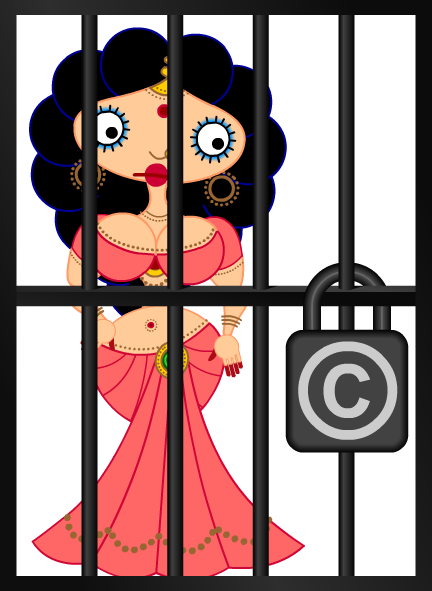Category: Sita Sings the Blues
Donatin’ for Sita
Want to donate to the Sita Distribution Project and help get Sita Sings the Blues out of “copyright jail”? Questioncopyright.org is the project’s new Fiscal Sponsor. Donate through them and get a 100% tax writeoff! And the project will get 100% of your donation (minus only what Google Checkout skims).
A word about credits in the film. I’d love to include the name of everyone who donates, and small donations help a lot and are most welcome. But I’m realizing that the names will have to be illegibly tiny to include all of them; or else the credits will go on and on and on and on, which means broadcasters will cut them out and then no one will get to see their names. Unfortunately I think I’m going to have to set some minimum donation amounts to get named in the credits, like $100 maybe. Donations of $1,000 or more get a larger credit under “Production Angels,” and $10,00 or more can be “Executive Producers,” or something like that….Once the film is released, we’ll also have a web site that maintains a list of all (even the smallest) donors (unless they choose to opt out) and that list can keep growing even after the release credits are “set.” Still I love small donations, and I want to encourage them. Any suggestions?
Sita’s Distribution Plan
Dear Audience,
That Roger Ebert article has brought a lot of attention to Sita‘s plight, and you are responding awesomely, as always. Audience, I trust you. So it’s time for me to share with you my distribution plan for Sita:
First I must decriminalize it to the tune of about $50,000. That’s down from the $220,000 the rights-holders initially quoted. However, that “bargain” price comes with many strings: a “step deal.” This stipulates that for every 5,000 home video units sold (DVD or download sales or on-demand sales) I must pay another $750 per song, meaning $8,250, plus middleman fees (lawyer or negotiator – I’ve already been billed about $10,000 just trying to negotiate with these corporations). Also for every $1million at the box office, I must pay another $3,500 per song, or $38,500.
To put that in perspective, after theaters, distributors, agents, etc. take their cuts and deduct their costs, $1million in theatrical receipts would trickle down to about $30,000 to $80,000 for me. Luckily(?) it’s very unlikely to ever generate that much box office revenue, so I’m safe. DVDs are another story – the corporations measure their fees per unit (it works out to $1.65 per), regardless of how much the DVDs sell for.
But the good news is, promotional copies are traditionally exempted from step deals. Everyone needs to make free promotional copies for reviewers, festival committees, journalists, etc, and those shouldn’t be “taxed” by the licensors.
Which brings us to step two: while making one DVD pressing of 4,999 copies, I will place promotional files of the entire film – at all resolutions, including broadcast-quality, HD, and film-quality image sequences – online at archive.org and as many mirror hosts as volunteer to share it. I will license it either as Creative Commons Share-Alike, or some equivalent of the GNU/Linux license. This will prevent it and any derivative works from ever being copyrighted by anyone. Of course this license won’t apply to the songs, which will remain under copyright by their respective corporate overlords. But clearing the licenses first will decriminalize it, and make it safer to screen in theaters (and theaters will be free to screen it and charge for it without obligation to me). The free online copies are promotional copies.
“But Nina, how will you make money?” The way artists always make money: donations, commissions, grants, patrons, speaking fees. Indie distributors can’t pay anywhere near what it cost me to make the film ($80,000 + $50,000 to clear rights + $160,000 living expenses over the years I made the film + my TIME) but they do lock up the rights for 10+ years. In the Digital Age, distributors function primarily as a barrier between artists and audiences, prohibiting access rather than facilitating it.
I’m betting that you, audience, can find me more money – and certainly wider distribution – than a commercial distributor could. I get wonderful emails from people like you, people who offer to set up little fundraising screenings, who write good reviews, and do lots of things to help. Audiences are so eager to help distribute films! Old-school commercial distributors not only ignore the power of the audience, they actively fight it, calling it “piracy” and “theft” for example. And the audience comes up with much better ideas than I or a distributor could (I didn’t think of doing fundraising screenings, you did). And once I free the film, I won’t have to do any more work on it! You, the audience, can take care of everything.
Here are some ways I imagine copylefting Sita could generate some income for me:
1. Direct donations (aka voluntary payments, aka “pay-what-you-wish”)
2. Ancillary products: t-shirts, pins, toys, books, merchandise. Under a share-alike license these will be open-content as well, but there is little incentive for competitors to invest in producing such merch when it is already available (and much incentive if a certain product is not available, which is good). Any companies producing merch could use their sharing profits with me as part of their marketing; fans are much more interested in seeing their $$ go directly to the artist, than being all eaten up by some publisher or distributor.
3. Sponsorships. We expect the film to spread far and wide under a free license, and a sponsoring credit would be excellent publicity for anyone who cares to make it. Corporations sponsor shows on Public Television all the time for this reason (and under the free license, Sita can also be broadcast anywhere. At least one PBS station says they’re committed to broadcasting it.).
4. DVD sales and auctions. Although the film may be downloaded and copied for free, some will prefer an “official” signed DVD from the artist. These could be sold directly by me in a limited edition (of 4,999), and/or auctioned online.
5. Voluntary payments from public screenings. We encourage the film to be shown in theaters, schools, etc. and anyone can set up a screening and charge admission. They may voluntarily send some of the revenue on to me. Most exhibitors already expect to pay something to distributors, and although this is completely voluntary, we expect many will be willing to do this.
6. Selling 35mm film prints to collectors, archives, museums, and (hopefully) distributors willing to try a non-exclusive service model instead of the existing licensing model. Prints cost about $2,500 to make; I could sell them for $5,000 each. This also outsources the expensive work of archiving.
7. Probably many more that we just haven’t thought of yet!
Now dear audience, if you’ve read this far, what do you think of this? Maybe some of you want to help. Here’s some help I could use right now:
Money
I’m about to take out a $50,000 loan, and am already deep in debt from having to hold on to the film. But obviously I can’t guarantee I’ll make it back. Donors and sponsors will, as always, be acknowledged in the credits of the final version. Big donation? Big credit. Plus I can modify the “intermission” scene to include messages from really, really big sponsors – like $50,000 sponsors – so get in touch if you’re interested. Questioncopyright.org is hoping to arrange Fiscal Sponsorship for the Sita distribution project, so that you could get a tax write-off by donating to them. They would pass the whole thing on to me without skimming any of it (most nonprofits skim 7 to 10%). Questioncopyright.org is AWESOME.
Even with the $50,000, I still may not be able to clear all the songs. So far only Warner-Chappell and EMI have informally agreed to those terms, but they haven’t issued contracts yet, and they can still change their minds for any reason. The rest of the rightsholders are under no obligation to agree. Now that the cat’s out of the bag, will they work with me or against me? Hence my next request:
Is there a lawyer in the house?
I mean a good, progressive, Free-Culture-oriented lawyer. Right now we have questioncopyright.org‘s legal counsel, whose experience lies in Free Software. The California-based Electronic Frontier Foundation hasn’t yet agreed to help directly (maybe they’ll change their minds!) but is looking for additional pro bono legal help for me here in New York. The coolest legal work seems to be in Software; I haven’t yet found anyone in Entertainment Law who really gets it. But if you’re out there, please get in touch! Let’s make a Sita Legal Defense team.
Love,
–Nina
Roger Ebert is my Homeboy
We’re both from Urbana, IL, where I grew up watching At The Movies on WILL TV. And now, he gives a thumbs-up to Sita:
http://blogs.suntimes.com/ebert/2008/12/having_wonderful_time_wish_you.html
Watch me go on and on (and on) about copyright!
See me babble away on my current favorite subject, copyright and what’s wrong with it, over at questioncopyright.org. Here’s a sample:
Yes, the video is squished horizontally, because it was in DV format but uploaded on square pixels (I can’t wait until everyone just uses solid-state progressive-scan cameras). Also the audio is way compressed – it thoundth like I’m lithping. But the ideas come through.
This interview was conducted by Karl Fogel on November 6, 2008, at the Software Freedom Law Center in New York.
Updated “Sita” trailer at archive.org
I finished it back in March, but neglected to upload it to archive.org until today. This one features the voices of Bhavana Nagulapally, Aseem Chhabra and Manish Acharya at the beginning.
You can see some other clips from Sita on composer Todd Michaelsen’s professional reel here.


